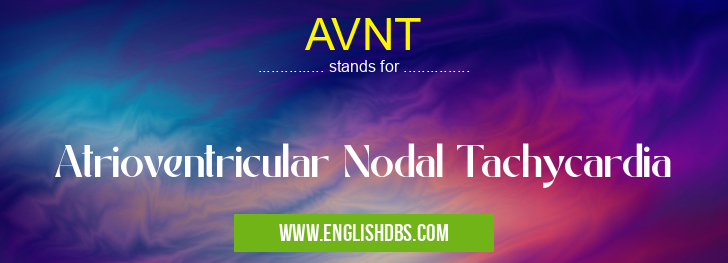What does AVNT mean in PHYSIOLOGY
Atrioventricular Nodal Tachycardia (AVNT) is an abnormal type of heart rhythm that is caused when electrical signals in the atria and ventricles become disrupted. This can lead to a rapid heartbeat, known as tachycardia. In order to identify and treat this condition, it is important to understand what AVNT is and how it can affect your health.

AVNT meaning in Physiology in Medical
AVNT mostly used in an acronym Physiology in Category Medical that means Atrioventricular Nodal Tachycardia
Shorthand: AVNT,
Full Form: Atrioventricular Nodal Tachycardia
For more information of "Atrioventricular Nodal Tachycardia", see the section below.
» Medical » Physiology
Essential Questions and Answers on Atrioventricular Nodal Tachycardia in "MEDICAL»PHYSIOLOGY"
What causes AVNT?
AVNT is caused by abnormal electrical signals disrupting the normal rhythm between the atria and ventricles. These abnormal signals can be triggered by things such as certain medications, stimulant drugs, or alcohol use. Stress and fatigue are also common triggers for AVNT.
How do I know if I have AVNT?
Symptoms of AVNT can include a rapid heartbeat (tachycardia), chest pain, shortness of breath, light-headedness and dizziness. If you experience any of these symptoms it is important to consult with your doctor and get tested for AVNT.
What treatments are available for AVNT?
Treatment options vary depending on the severity of the condition and other factors such as age and medical history. Common treatments may include medications to slow down your heart rate or reset the heart's rhythm, or a procedure called an ablation where tissue causing disruptions in electrical activity is removed from your heart using specialized techniques.
Are there complications from having AVNT?
In some cases, untreated or poorly managed AVNT can cause complications such as atrial fibrillation or stroke due to clotting in arteries supplying blood to your brain. Additionally, prolonged episodes of tachycardia increase your risk for developing heart failure down the line.
How can I reduce my risk of getting AVNT?
Reducing stress levels through mindful activities such as yoga or meditation may help reduce risk of developing this condition, although further research is needed to confirm this claim. It's also important to avoid certain stimulant medications as these can trigger an episode of tachycardia while talking with your doctor about potentially dangerous side effects associated with specific drugs you may be taking. Finally, monitoring alcohol consumption may help reduce episodes of arrhythmia associated with drinkingr excessive amounts.
Final Words:
Atrioventricular Nodal Tachycardia (AVENT) is a serious but treatable condition that requires early diagnosis and treatment in order to prevent possible complications that could arise from lengthy episodes of tachycardia or having long-term untreated cases. Understanding what causes this condition, how it presents itself clinically, and potential lifestyle modifications that one could take can help improve outcomes for patients with this condition.
